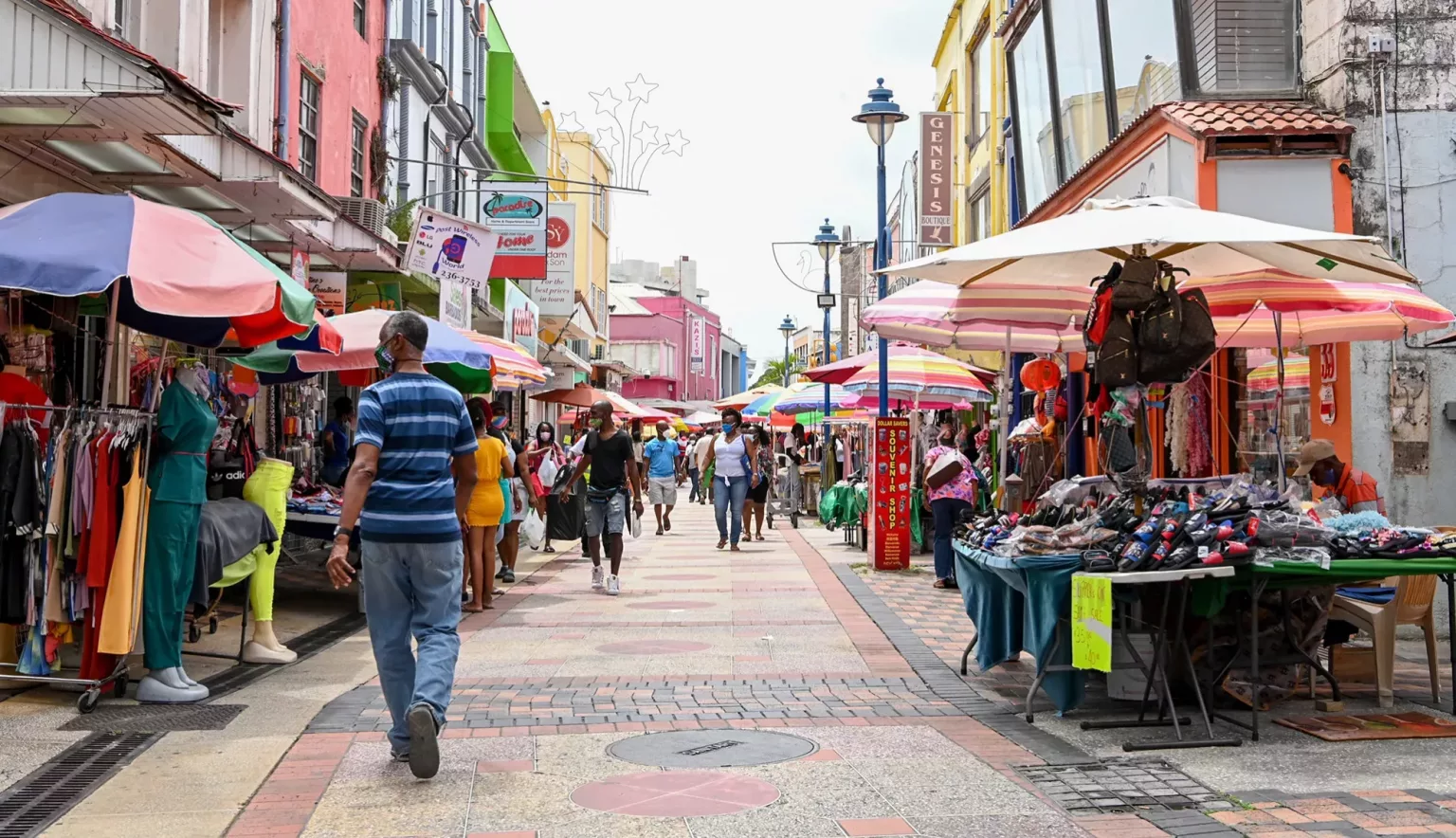We examine Barbados’ dynamic and industrial landscape in the wake of the pandemic with Barbados Chamber of Commerce & Industry (BCCI).
INTRODUCTION
Whilst Barbados may be renowned for its beaches, this dynamic South Caribbean island nation is equally reputed for its robust and stable business environment. Most recently, the country drew attention due to its implementation of an innovative Nomad Digital Residence visa for remote workers, looking to enjoy the islands’ beneficial climate – both in terms of natural beauty, and business.
Barbados’ advantageous history of political and social stability alongside a steady economic performance is conducive to a streamlined and robust infrastructure, including a sophisticated telecommunications service. The island’s low-tax reputation and relatively high per capita income remains a major draw for international players as a haven for business.
For an island that measures just 21 miles long and 14 miles wide, Barbados’ size belies the wealth and sheer range of industries that are established here. The idyllic nature of the islands’ scenery translates to tourism contributing a significant amount to the national GDP (36.2 percent as of 2019), alongside other major sectors including financial and business services, manufacturing and agriculture, that thrive within an open, market-oriented economy.
An independent island nation within the British Commonwealth, Barbados’ healthy population can be considered a significant natural resource in itself as a ready labour source. Since 1987, Barbados has hosted a small stock exchange catering to trading shares of both local and regionally-owned companies, which now solely operates online.
With three-fourths of the island’s landscape composed of arable land, the production of sugar cane has been a mainstay of Barbadian industrial activity since the 1950s, although the prominence of this in the economy has lessened in line with greater diversification within agriculture through government-sponsored programs. The significance of manufacturing within the economy has also decreased, with the advent of globalization and trade liberalization increasing competition from cheaper imports.
Other challenges prevail across industries. These include price increases, renewable energy approvals, front of package labelling, bankage fees, the Customs Bill, and the Duty-free sector proposal to government – all of which are topical concerns that the island’s business community seeks to address.
At present, unified efforts amongst the Barbados Chamber of Commerce and Industry (BCCI), the national government and the Barbados Private Sector Association (BPSA), are concentrated on the sustainable development of business across the island and within the wider CARICOM (Caribbean Community) Single Market.
Q&A WITH MISHA LOBBAN CLARKE, EXECUTIVE DIRECTOR, BARBADOS CHAMBER OF COMMERCE & INDUSTRY (BCCI)
The BCCI has been the trusted voice of Barbados’ business community since 1825. We discuss the current state of industry across the island and the Chamber’s pioneering three-pillar strategy with Executive Director of the BCCI, Misha Lobban-Clarke and the newly inaugurated President, Anthony Branker.
As the oldest private sector organization in Barbados, how has the BCCI developed and progressed since inception in terms of its key objectives?
Misha Lobban Clarke (MLC): The Barbados Chamber of Commerce and Industry (BCCI or Chamber), since its inception in 1825 has been promoting the diverse interests of the business community in Barbados through advocacy, representation, and trade facilitation. The organization’s goal is to enhance membership engagement through the provision of business support services to enable businesses to grow and prosper within the Barbados environment and within the CARICOM Single Market economic space.
A key priority of the BCCI is to be ‘top-of-mind’ for trade and industry information and to enhance the social and economic landscape of Barbados by investing in people and communities across the country.
The liberalization of markets; the emergence of powerful regional trading blocs across the globe, and the growing dominance of the global supply chains have all combined to create a radical shift in the culture and operations of businesses, even within a Small Island Developing State (SIDS) like Barbados. These changes have been driven by the adoption of more advanced technology and a re-engineering of roles and responsibilities within business operations.
The Chamber, like other organizations, has undergone considerable changes in its structure and operations in order to remain relevant. Following an extensive strategic planning exercise, completed in the last quarter of 2020, and which included the input of BCCI members and key stakeholders within the private sector, the goals and strategic direction of the Chamber have been redefined to provide a clear roadmap for the organization over the next three years (2021-2024). The objective of our new strategic plan is to closely align the Chamber’s key mandate and objectives with our local and regional social and economic realities while ensuring that we continue to meet the needs of our membership. The plan will specifically inform the BCCI’s evolving role as the leading advocate for businesses in Barbados and will ensure that the Chamber is well-positioned to anticipate and respond to the changing needs of our membership and the wider business community.
What do you find most exciting about working within Barbados’ business sector?
MLC: The business sector in Barbados is very dynamic and multi-faceted in nature. The Chamber currently has a membership of 237 organizations representing diverse sectors including retail and distribution, manufacturing, financial services, international business ICT, professional services and the energy sector. As the Executive Director, I am involved in all aspects of the functions of the Chamber.
Leading the Chamber at this time is both interesting and challenging. The scope of my work is broad, and the environment is fast paced, which I find highly motivational. The Chamber’s agenda is a very active one and there is always something new to learn. I take much pride in being able to support and influence decisions both at the national level and within my membership that can facilitate business ease and success.
Since I assumed the position in June 2019, my mandate has been to manage the operations of the Barbados Chamber and advance the strategic goals of the organization. My role is also to ensure that the Chamber becomes a more visible, engaged and profitable organization which enhances the value proposition to members and assists them in navigating the turbulence of the current business environment. I am also tasked with improving organizational efficiencies by streamlining the structure and operations of the Secretariat to make it more fit-for-purpose, agile and responsive to the changing and diverse needs of the business sector in Barbados.
On the flip side, what are its biggest challenges?
• The increasing costs of doing business due to the necessary structural adjustments under the IMF program (The Barbados Economic Recovery and Transformation (BERT) program) which the country has embarked upon, remains a key challenge for businesses. Increasing costs were also exacerbated by the disruption to the global supply chains due to the COVID-19 pandemic and the increases to commodity prices (including oil). In addition, as a tourism dependent economy the impact of the grinding halt to the cruise and land-based tourism industries have been devastating on the Barbados economy.
MLC: Leading an organization through a process of change is in itself a challenging proposition, and when you add the unprecedented threats to business survival created by the global COVID-19 pandemic, it creates an even greater challenge for anyone in leadership. Some of the key issues we are currently grappling with are as follows:
• Though some improvements have been made in recent years, the lack of business facilitation and ease of doing business in Barbados remains a big concern to business owners. Without the necessary improvements, foreign direct investment and ultimately economic growth could be hampered in Barbados.
How has COVID-19 affected Barbados’ business community?
MLC: The implementation of a national shutdown and other emergency measures by the Government of Barbados in response to the pandemic, impacted businesses negatively across all productive sectors. The tourism industry, which is the chief economic driver, was one of the early casualties due to global travel restrictions and the closure of borders by countries to curtail the spread of the virus. This resulted in a ripple effect in terms of extensive losses for businesses within the industry and those sectors that rely on tourism.
The Governor of the Central Bank of Barbados (CBB), Cleviston Haynes, in his review of the Barbados economy for the first half of 2020 acknowledged that the COVID-19 pandemic has altered the global economic outlook and that the Barbados economy faced the prospect of a double-digit decline in economic activity. During the April to June quarter 2020, the cessation of activity in the tourism sector, combined with a national shutdown and temporary closure of business, deepened the initial contraction that was realized during the first three months of the year, the Governor stated. He further reported that preliminary data suggested that economic output fell by 27 percent in the second quarter, resulting in an overall decline of almost 15 percent over the first six months of 2020.
The World Bank’s 2020 Economic Report on Barbados supported the CBB report stating that “the country experienced significant drops in tourism arrivals, during the first three quarters of 2020 which severely affected tourism, retail, and business activities. With the near full travel closure and quarantine measures, the local economy was estimated to have contracted 17.3 percent by the end of the year.” It is estimated that Barbados lost approximately two billion dollars in economic activity and the country was forced to increase its debt burden, to cushion the impact of the COVID-19 pandemic.
Every crisis also offers opportunities. New businesses have been emerging while others have been forced to innovate and look at new modalities for how they produce and deliver goods and services. Opportunities to jump start investments and boost economic activity include increasing the use of technology or digitization to increase productivity and enhance service quality and the delivery of products and services. Businesses are now expanding their use of online platforms for the delivery of products and services and implementing new digital payment options. Renewable energy projects, as well as building a more sustainable agriculture program to ensure the adequate supply of food for local consumption are areas of opportunity being explored by businesses and which can help to boost economic activity.
Despite these challenges, BCCI has been responsive in helping businesses to navigate through this crisis by ongoing engagement with members and ensuring access to useful and timely information and resources. In addition, the Chamber has contributed to the shaping of public policy and critical macro-economic decisions that impacted business operations. The Chamber was also proactive in lobbying and engaging the government on behalf of members of the business sector prior to and during the period of the national shutdown. The Chamber has also adjusted its strategic focus to ensure that it is more relevant to the existing economic environment in which members operate and has prioritized its agenda to focus on business resilience, recovery and sustainability while promoting operational excellence and innovation through the greater use of technology.
What trends are currently transforming businesses across Barbados and how do you promote this to your members?
President Anthony Branker (AB): Assistant Secretary-General, Trade and Economic Integration, CARICOM Secretariat, Joseph Cox is quoted as saying, “businesses that will survive the period of transition to the ‘new normal’ are those that exhibit a bold vision, a willingness to innovate; practice discipline, execution and adapt with agility. This requires optimization of the labour force, and in that regard, upskilling and rescaling are integral accelerators for the future growth of businesses.”
This statement outlines the clear path businesses must take to remain viable. The ‘new normal’ calls for a business that is constantly evolving while embracing a reassessment process. It is necessary for businesses to adapt to remote access, video conferencing, and file-sharing tools to ensure continuity of operations. With this, many companies have realized that it is now not necessary to keep teams in the same office to continue delivering an excellent service in real-time.
We can’t predict the future just by reviewing the past, and we are all now aware of the fragility of our global systems, hence a key component for business viability is a resilient system which makes sense of what is happening in real time, constantly updating their predictions, and being agile enough to take early action before a major risk escalates.
The emphasis for businesses must change from rear-facing monitoring and review (such as incidents and losses) towards forward-facing prediction. The key capability needed for an effective forward-facing approach is the ability to develop realistic and robust ‘cause effect’ models. The Chamber recognizes that virtual training has proven to be as efficient as in-person training. Our strategy therefore will be to provide relevant webinars to educate and inform members on these new but mandatory business practices.
Have you got any projects in the pipeline you wish to highlight?
AB: The Chamber adopted a 2021-2024 Strategic Plan developed upon the pillars of building, connecting, collaborating and innovating.
Our strategic plan (alongside other things) centers on:
• Strengthening our institution in-line with the strategic direction
• Reshaping the membership service offerings and benefits
• Developing a human capital/talent support system for members
• Developing a digital transformation (including e-commerce) support system for members
• Developing a Business/Resilience program to support membership
Additionally, I aim to establish a partnership with the National Transformation Initiative to explore the huge training opportunities available to employees across our businesses. This training will grant exposure to non-traditional areas of study.
To give support in the area of service excellence to our members. I plan to explore the memorandum of understanding (MOU) we have with the University of the West Indies to see how best we can facilitate training at various levels in service excellence.
BCCI endeavors to create sustainable economic progress for Barbados and the CARICOM Single Market. Are you optimistic about the Chamber’s future in regard to this goal?
AB: When the global economy eventually manages to recover, our businesses will still be vulnerable to further shocks. The business community needs to adopt better strategies and tactics to become ‘anti-fragile’. Undoubtedly, these new strategies will include measures such as reducing supply-chain vulnerability, ensuring adequate backup systems and reducing the dependence of operational continuity on people physically working together.
Our approach to member education will therefore be focused on the following:
1. Readiness for change: Reinforce the need to embrace, and commit to, new ways of working around risk. This means recognizing that the past is not a good playbook for the future, adopting agile work methods, and being willing to experiment and learn.
2. Data strategy: Regard data as the ‘new currency’ and invest in strong data governance to secure a robust single source of truth, both external and internal.
3. Capabilities: Getting access to required capabilities needed to build a dynamic business resilience system.
So even though the future is unpredictable, the Chamber will be playing its role in sustaining economic progress for Barbados through facilitating various business strengthening initiatives. The Chamber is committed to this strategy and expect it will yield significant benefits to our members.

































